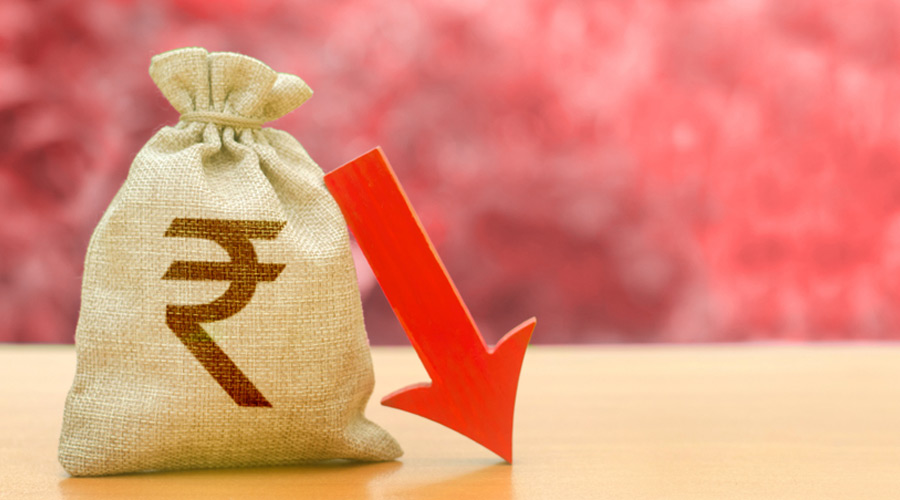More market turmoil looms for the rupee and shares with investors spooked by soaring oil prices as the Ukraine war rages and the impact that sanctions against Russia could have on India and the global economy. The rupee crashed Monday to an all-time low, sliding by a huge 81 paise to close at 76.99 just short of the 77-mark and analysts predict it will head further south, as investors rushed for refuge in the US dollar. The NSE Index tumbled by 1,500 points as asset safe havens like gold breached $2,000 an ounce.
The slide came as Brent crude spiked to a near 14-year high of $140 amid fears of major supply disruptions in the global oil market. Brent oil futures hit $128.18 a barrel.
The rupee, trading near its all-time low of about 77 against the dollar early on Tuesday inflation, economic growth, household spending and investments are just some of the expected economic casualties of Russia’s invasion of Ukraine.
"The extraordinary uncertainty triggered by the war has pushed commodity markets into turmoil,” said V.K Vijayakumar, chief investment strategist at Geojit Financial Services, calling on investors to be “cautious.”
The spiralling price of oil represents a “big shock” to the economy that could impact global growth and aggravate inflationary pressures,” Vijaakumar said, forecasting that, “in India, growth will be lower and inflation higher than projected” for the next financial year. India imports nearly 80 per cent of its oil requirements.
A report from Emkay Global Financial Services added to the gloom, raising the spectre of a global recession. "Global economies are facing a heightened risk of a recession this year as Russia’s invasion of Ukraine severely disrupts supply chains and has flared up commodity prices since the conflict began. Alongside the rises in the price of crude, important metals like nickel, aluminium and copper prices have also rallied to hit all-time highs.”
A global boycott of Russian oil would “put enormous pressure on the already tight supply side,” the Emkay report added.
Kotak Institutional Equities, which says global crude prices could remain high over the next six to 12 months, calculates that an average crude price of $120/bbl would slice 1.9 per cent off India’s growth in the next financial year.
The rise in crude oil prices is also bad news for the government’s accounts with Aditi Gupta, an economist at the Bank of Baroda saying that the surge in oil prices poses “considerable risks” to India’s economy.
"The implications for India with rising crude is that if crude sustains around or above 100, then every 10 dollar rise in crude effectively means that the net trade deficit for India goes up by $15 billion," said Mayuresh Joshi, head of equity research at William O'Neil & Co, India.
“Also the government is expected to have to cushion the impact of higher oil prices at the pump which would mean lower excise tax and hence lower revenues. Excise revenues may decline by $20 billion, assuming a Rs10/litre cut in excise duty on diesel and gasoline,” analysts at Kotak Securities suggested in what they called the “crude cost of someone else’s war.”
In addition, they highlighted “significant upside risks to inflation and downside risks to corporate profits through increased pressure on margins and volumes.”
Higher spending on oil, cooking gas and other staple products will mean less disposable income in households and lower consumer spending which will have a knock-on effect on growth. Households, especially lower and middle-income households “will bear the cost (of increased energy prices) indirectly through higher prices,” said Kotak. This, effectively, will result in a consumer hit of more than $20 billion, representing 0.7 per cent of gross disposable income, in the coming financial year, the brokerage said.
Even before Russia’s attack on Ukraine, private consumption which contributes nearly 55 per cent to India’s GDP, was below pre-pandemic levels.
Separately, Motilal Oswal's monthly 'Bulls and Bears' report said that the markets witnessed the second steepest month-on-month decline in 23 months, jolted by the geopolitical uncertainty.
"The Nifty ended 3.1 per cent month-on-month lower at 16,794 in February 2022. This was the second consecutive month of a decline and in fact the second steepest MoM decline in 23 months. “Metals were the only gainer with an 8 per cent rise, while PSU Banks, media, real estate, telecom, and auto were the top losers in February,” the report said.










